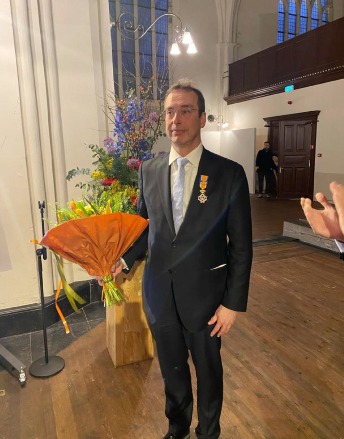Leon Verstappen gedecoreerd tijdens jubileumcongres
Leon Verstappen (Meijel, 1965), hoogleraar Notarieel Recht aan de Faculteit Rechtsgeleerdheid van de Rijksuniversiteit Groningen, is vrijdag 12 januari verrast met een Koninklijke Onderscheiding in de categorie Officier in de Orde van Oranje Nassau. Tijdens het congres in de Akerk, waarmee zijn 25-jarige ambtsjubileum werd gevierd, ontving hij de decoratie uit handen van burgemeester Koen Schuiling van de gemeente Groningen.

Toen Leon Verstappen in 1989 promoveerde aan de Radboud Universiteit van Nijmegen wist zijn promotor al dat hij geboren was om hoogleraar te worden. Die voorspelling kwam in 1998 uit, en wel bij de Faculteit Rechtsgeleerdheid van de Rijksuniversiteit Groningen. Vanaf het begin van zijn academische loopbaan combineerde Verstappen de wetenschap met de praktijk. Zo werkte hij tijdens zijn eerste baan als universitair docent parttime als kandidaat-notaris. Ook na zijn benoeming tot hoogleraar bleef hij actief in de praktijk: zo vervult hij verschillende posities buiten de universiteit, onder andere als plaatsvervangend raadsheer in de familiekamer van het Gerechtshof te Den Haag en als juridisch adviseur.
Vooraanstaand wetenschapper
Het academische werk van Verstappen op het gebied van notarieel recht is nationaal en internationaal van grote waarde. Ook op het gebied van registergoederenrecht, huwelijksvermogensrecht en ondernemingsrecht wordt hij gezien als een vooraanstaand wetenschapper. Hij beschikt over de gave om zeer complexe maatschappelijke en juridische vraagstukken logisch, analytisch en begrijpelijk over te brengen. Dat doet hij niet alleen in zijn wetenschappelijke publicaties, maar ook in zijn frequente bijdragen aan rapporten voor het Wetenschappelijke Onderzoek en Documentatie Centrum en in zijn juridische antwoorden op maatschappelijke problemen. Met meer dan driehonderd wetenschappelijke en vakpublicaties, waaronder 150 boeken en boekbijdragen, heeft hij een grote stempel gedrukt op zijn vakgebied. Ook werkte hij mee aan verschillende succesvolle wetsvoorstellen en was hij medeoprichter van onder andere het Groningen Centre for Law and Governance en het Netherlands Institute for Law and Governance.
Amicale, verbindende decaan
Binnen de faculteit maakte hij naam als een amicale, verbindende decaan die goede banden had met medewerkers uit alle lagen van de organisatie. Collega’s, studenten en promovendi noemen hem benaderbaar en vriendelijk, loyaal en toegewijd. Het decanaat vervulde hij tussen 2006 en 2010, waarbij hij ook actief bleef in het onderwijs en onderzoek. Hij beet zich in die periode vast in verschillende lastige dossiers en haalde er het maximale uit voor de faculteit. Daarnaast heeft hij de Groningse opleiding Notarieel Recht met grote bezieling op de kaart gezet waardoor deze opleiding van zeer hoge kwaliteit is en daardoor kon uitgroeien tot een van de grootste in Nederland.
Inspirator voor studenten en promovendi
Die warme betrokkenheid blijkt ook uit zijn persoonlijke inzet voor studenten en promovendi. Zo verzorgt hij kosteloos tentamentraining en is hij gul met zijn contacten uit zijn eigen netwerk. Tijdens zijn colleges combineert hij de academische theorie vaak met voorbeelden uit de notariële praktijk. Ook verwijst hij graag naar actuele politieke dossiers op het gebied van wetgeving, waardoor zijn studenten dicht bij het vuur zitten. Hij speelt een waardevolle rol binnen Vevonos, de studievereniging voor notariële studenten, en werd vanwege zijn verdiensten in 2022 benoemd tot erelid. Zijn promovendi roemen de inspirerende manier waarop hij vertrouwen geeft en met zijn feedback en eerlijke kritiek jonge wetenschappers motiveert om zich verder te ontwikkelen.
Maatschappelijke betrokkenheid
De maatschappelijke waarde van zijn grote kennis en inzet blijkt bijvoorbeeld uit zijn betrokkenheid bij de oprichting van de internationale, innovatieve stichting Land Portal. Hij heeft zich altijd strijdlustig ingezet voor deze stichting, die met behulp van een geavanceerde website, webinars en andere digitale communicatiemiddelen wereldwijd informatie en data over grond beschikbaar stelt. Als bron van informatie en kennis draagt Land Portal substantieel bij aan het bevorderen van de rechten van kwetsbare, landloze groepen.
Huwelijksvermogensrecht
Diezelfde strijdlust blijkt ook uit zijn werk op het gebied van het Nederlandse huwelijksvermogensrecht. De wetsvoorstellen waar hij nauw bij betrokken was hebben ertoe geleid dat dit recht is gemoderniseerd. Zo is de algehele gemeenschap van goederen afgeschaft en is daarvoor in de plaats een passender systeem gekomen voor echtparen, dat bovendien beter aansluit bij andere stelsels in Europa. Ook deelt hij recente ontwikkelingen in de wetgeving, rechtspraak en vakliteratuur graag met de praktijk. Als hij merkt dat de belangen groot zijn maakt hij altijd tijd: desnoods overlegt hij online in het holst van de nacht, met een groot hart voor de juridische zaak.
Meer nieuws
-
08 december 2025
Kleurrijke Kopstukken: Bert Röling
